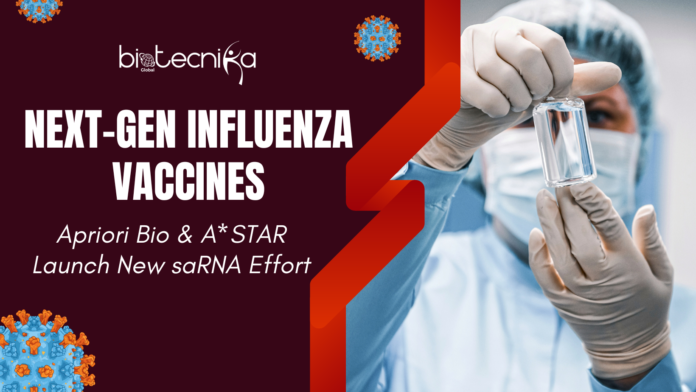Influenza Vaccines: Apriori Bio & A*STAR Launch New saRNA Effort
Viruses are constantly changing, often faster than we can predict. To tackle this, Apriori Bio, a Boston-based Flagship Pioneering company, is teaming up with the Infectious Diseases Labs at Singapore’s A*STAR. Together, they plan to develop smarter and more resilient influenza vaccines using self-amplifying RNA (saRNA) technology and AI-guided antigen design.
For life science students watching global biotech unfold, this partnership offers a real-time lesson in how deep scientific expertise, technological innovation, and international collaboration can converge to tackle some of the world’s toughest infectious disease challenges.
Why This Collaboration Matters
Influenza remains one of the most unpredictable viruses we face. Seasonal strains shift year to year, and pandemic-capable variants, like H5 avian influenza, pose a constant threat. Traditional vaccine development often struggles to keep pace, especially when fast mutation creates escape variants.
This is the problem Apriori Bio and A*STAR are trying to solve.
The partnership combines:
- Apriori Bio’s Octavia™ platform, which uses computational intelligence to design antigens that anticipate viral evolution before it happens.
- A*STAR IDL’s advanced saRNA delivery technology enables strong immune responses, even from low-dose, single-shot vaccines.
Together, they plan to co-develop and evaluate next-generation saRNA influenza vaccines that can offer broader, longer-lasting protection and be ready ahead of emerging threats.
The first target on their roadmap is the development of an improved H5 influenza vaccine, one designed proactively, not reactively.
A Step Toward Variant-Resilient Influenza Vaccines
CEO of Apriori Bio and CEO-Partner at Flagship Pioneering, Craig Williams, described the collaboration as a critical milestone in Apriori’s mission. This collaboration is an important step, as they are strengthening the vaccine design and delivery process. This will help the researchers in driving lasting immunity against one of the world’s most challenging viruses.
Williams highlights that Apriori’s AI-enabled platform is not just forecasting viral evolution. It’s reshaping what scientists can do with those predictions.
By understanding likely future variants, vaccine design can become anticipatory rather than catching up after the virus spreads.
He also highlights that with A*STAR IDL’s next-generation RNA delivery capabilities, they will now aim to change the standard of protection for patients worldwide.
For students, this represents a powerful example of how AI and biology can intersect to revolutionize immunology.
A Singapore Hub for Global Preparedness
Professor Lisa Ng, Executive Director of A*STAR IDL and a respected immunologist, emphasized the broader purpose behind this partnership. This collaboration reflects the shared commitment to translate research into real-world impact.
A*STAR brings decades of expertise in RNA technology and infectious disease research. Singapore has steadily built itself into a biomedical research powerhouse, and this partnership aligns with the country’s push to improve global outbreak preparedness.
Ng added that by combining A*STAR IDL’s expertise in RNA and infectious diseases with Apriori’s AI-guided antigen design, the partnership aims to speed up vaccine development and improve preparedness for future outbreaks in Singapore and around the world.
For young scientists, this highlights the growing role of Asia in shaping global biotech innovation.
Solving Two Major Challenges of H5 Vaccine Development
H5 influenza, commonly associated with avian sources, has long been considered a pandemic threat. While current vaccines exist, they are far from perfect.
Harry Kleanthous, Chief Scientific Officer at Apriori Bio, summarized the key issues:
- Weak single-dose immunity
- Limited protection against emerging variants
saRNA technology offers a promising solution. Unlike conventional RNA vaccines, saRNA can amplify itself inside cells, meaning a lower dose can generate a stronger, longer-lasting immune response.
Kleanthous said that saRNA could help deliver long-lasting protection with just one dose, and that the antigen sequences designed through the Octavia™ platform may offer broader coverage against emerging strains.
By addressing both durability and breadth, the team aims to create what Kleanthous calls the first anticipatory H5 vaccine, a formulation designed for variants that have not yet emerged but are predicted through AI.
This marks a shift in how biotech companies think about influenza vaccines: not just responding to known strains, but preparing for tomorrow’s viruses.
Strengthening Health Security Through Innovation
The Assistant Chief Executive of A*STAR Innovation and Enterprise, Ms. Irene Cheong, said the partnership is an important step forward.
She explained that combining both teams’ strengths in RNA and vaccine science will help protect communities more effectively and improve global health security.
She noted that A*STAR is excited to collaborate with a Flagship Pioneering portfolio company, given the organization’s track record of building cutting-edge biotechnology platforms.
The partnership is backed by Flagship Pioneering’s broader institutional collaboration with A*STAR, aimed at advancing biomedical technologies and promoting Singapore as a global hub for innovation.
What This Means for the Future of Influenza Vaccines
For global public health, this collaboration represents a meaningful shift toward smarter, more adaptable pandemic preparedness. For the biotech industry, it signals the rising importance of AI-enabled vaccine design and RNA-based platforms.
And for students in life sciences, this is a moment worth noting. It shows how multidisciplinary thinking, combining computational biology, immunology, RNA engineering, and global collaboration, can reshape the future of medicine.
As influenza continues to evolve, Apriori Bio and A*STAR are betting big on a new generation of influenza vaccines that can stay ahead of the virus, not behind it. If successful, their work could mark one of the most important steps yet in building a healthier, more pandemic-resilient world.






